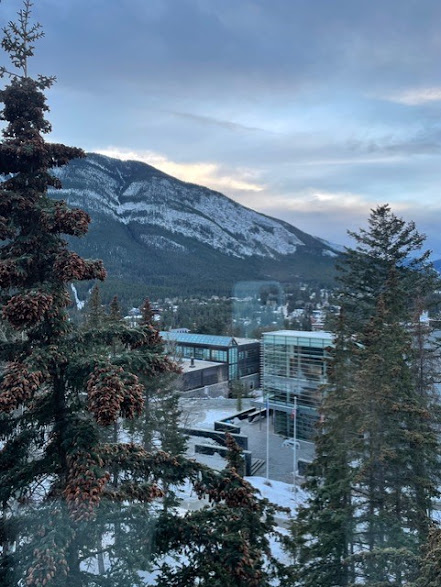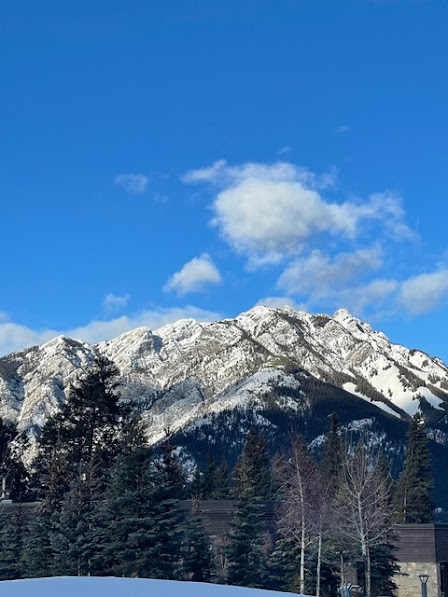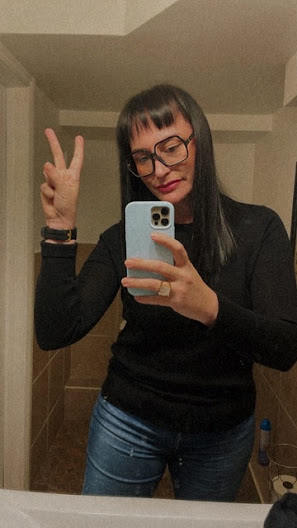The only
time my mother went away, I was eight or nine years old. Mum was accepted to a
three-week residency for arts administrators at the Banff Centre. We stayed at
home in Whitehorse. This time became an important flashpoint within family lore
– this was when my stay-at-home mother, with a background in art history, would
begin her return to her professional life. Banff, a place we had spent time
visiting as a family, now had a different meaning to us. It became the locus of
a secret sliver of mum’s life – a happy fragment that always provokes smiles
and joyful recollections, but also the source of burning, youthful curiosity.
The photos of her smiling, solo against the backdrop of the Rockies are
inflected with a sense of possibility, of a person in transition. A person who
is a self. Banff was a site for renewal and the making of decisions.
My
partner, decades ahead of me in his writing career, attended a Leighton
residency at Banff in 2019. The Leighton Artist Studios are intended for
independent, self-directed work, and this suited him well. Aaron wrote most of
a novel there. He sent me photos from the little boat in the forest that was
his writing space for the duration of his stay. Although he shared aspects of
his time at the centre, much of his daily life at Banff remained a mystery
because I was not there. I couldn’t picture his days. I could sense that, much
like my mum’s time in the mountains, he too was solidifying his commitments to
his work by making the time to be there. Banff needs time and space, but also
lends it.
A few
years later, I had come around to the idea that I was enough of who I wanted to
be to take on a Banff experience of my own. I wanted to at least try on the
idea. Then came word that one of my very favourite writers (Lisa Robertson,
whose work is one of my academic preoccupations) was going to be faculty for
the 2023 Winter Writer’s Retreat and I couldn’t resist applying. I felt
compelled to submit despite my perpetual imposter syndrome and the notion that
at this time in my life I was focusing only on my academic career – I remained
uncertain of how poetry fit with my academic research even though they had
always seemed like strange bedfellows. Poetry is a space for processing
thinking and had largely felt ancillary to other forms of writing, but at the
same time I have an innate sense that this kind of processing has value as a
method. As more and more friends urged me to apply, I decided, why not? Why not
embark on this journey (now well-trodden) to see if a life of creative
production might fit? It seemed like a logical step in my trajectory. But I
kept my expectations low, especially when I learned that Banff had received a record
number of applications for this session. I could barely process my elation when
I was accepted.
I applied in October and received word in
November; the residency would begin in January. Below are some notes I made
during the first days of my stay.
Officially
day one of my retreat. We had a workshop led by our faculty mentors, Lisa and
Nasser Hussain, and it was quite productive. I shared a little bit about
process and talked about subjectivity and materiality, my other themes. Others in
the room talked about such things as what they carry, illness, and what it does
to the way you feel about time, memory, and its fleetingness, and motherhood,
electricity, and circuity. I am not used to this environment, where I am
surrounded by my peers. I am not accustomed to caring this much (although
perhaps I always care), caring in that I love each of them, and I want them to
love me. I want to love this time. I want to look back on this as a
life-changing moment that is entirely positive.
To shake
off the intensity, I decide to walk down the mountain into town for the first
time. I’m wearing my winter things, my city coat, my (relative) finery. Perhaps
a bad decision when I have more practical down activewear at my disposal. But I’m
at Banff! I want to feel the most like myself that I have ever felt. I want to
wear my new coat and I want to feel chic. I want to feel very good at all
times. So I’m wearing my coat, trying to negotiate the icy pathway, and I see
Lisa. We waved to each other, we are friends – or it feels that way, a few days
in. I’m still feeling a bit like an interloper. I am feeling like I’m here
because I am the recipient of a favor. Someone has done me a solid. I do not
yet see exactly how I fit within this group in terms of my achievements, writing,
and persona. I feel like persona plays a big role in the ways that people have
been curated in this group. We all fit together like the cast of a complicated Hollywood
drama. So many in my group possess a mature kind of talent that I aspire to in
my own work. Others ooze with promise and can articulate exactly why. This is
part of why I am loving every moment. I get to be surrounded by people I would
dream to spend time with. I have two weeks with a well curated group of dream
people.
I’m
wearing my wool. I am negotiating the ice. I am not exactly sure where the
trail is (the maps seem vague; everything is blanketed by snow) but I have a
sense that it is in the far corner of campus and I turned out to be correct.
And then once I find the correct path I realize that there are two beautiful
deer, munching placidly and watching me with giant, watery eyes, black pools of
intensity. I speak to them softly, hello deer. Hello beautiful watery eyes.
Hello eyelashes. I will not harm you. I love you. The trail is much icier than
I anticipated so not only am I walking like a penguin I’m also sliding the way
that we did in the hallways as children in our socked feet. I have a relatively
good centre of gravity. I feel oddly proud at how well I am negotiating this ice
on the trail. there is no one to see me being extremely talented at negotiating
this ice. I bask in the feeling of demonstrating a sort of elegance in a
strange situation and being by myself. I’m also enjoying the beautiful trees. I’m
enjoying the music in my headphones. I feel so embodied as I glide down the
mountain. It is a nice time. At the same time, I don’t feel like walking, and
it strikes me that I may become accustomed to unusual comforts in the past few
days. I have adjusted to the good life that this residency affords. In my
Toronto life I usually walk a lot more than I have been, but everything at
Banff is so close. My accommodations are all in one place. My food is down the
hall. The gym is beside the dining area. The library is across the street from
my room – I can see it from my window. In all of this, this surreal landscape
and break from my home routines, I again feel like I’m in a dream.
Being in
Banff (the town) feels so familiar. I have been told that the city can never
expand. There is no building that happens in the city because there are
parameters to the national park. It makes sense, but that means that everything
remains quite familiar. I reach for memories of travelling to Banff with my
family. I try to remember grandparents, childhood, nostalgia. It feels rather
like putting on an old coat. It fits, but I’m different now. I’m the adult now,
a writer.

I don’t
know what I expected of Banff. I don’t know if I hoped it would be different.
It has been over 20 years since our last family visit. In some ways, I wish
that there was a way to cleanse a place of memories that tend to haunt it.
Maybe that’s part of what I am doing well, I am here. in a lot of ways, I feel
I’m celebrating mum’s life in a most decadent way, her residency and her
renewal, all of those things that happen in a mother’s life, when they are
granted space to rediscover who they are. There are a number of mothers in my
group, in my writing retreat. I can see that, for some, this is perhaps the
first space they’ve been granted (or have taken, claimed) to re-explore their
writing practices, and it makes me think of how things must’ve been for my
mother though with arts administration, her profession. Maybe I’m comparing
apples to oranges, because professional and creative practice can be such
different animals, but I think the space in an adult woman’s life is often so
limited, particularly for rediscovering parts that are less domestic, or that
inhabit a space outside the designated routine, the relational spaces we
inherit from our mothers. I’m not a mother but I can’t help but try to see my
own mum in the mothers around me. Even though I’m not a mother, these thoughts,
reflections on my mum’s life, allow me to relish the space this experience is
affording me too. My beautiful hotel room and spacious office are Woolfian
rooms of my own. While I’m here, the mountains out my window are mine, too.
Our time
is structured, but my time is my own. It’s incredibly quiet. January in the
mountains. Much of the centre is glass, windows. Many of us are enraptured by
the changing views of the Rockies. The light bounces off the snow. Sometimes
the views are bright white with blue skies. Sometimes everything is pink or
lavender. I take so many photos but none really do the space justice. The air
is thin and crisp, clean as though filtered, conditioned. Despite the altitude
or because of it, I inhale the air like it’s a rare nutritional supplement,
expensive. All of this feels like it’s good for me. All of this feel special. I
take a yoga class and stare at the giant white mountains as I box breathe.
Inhale, hold, exhale, hold. Everything holds the potential to be a poem.
And I do
write. I’m restless so I write between moments. I eat at the ridiculously
luxurious buffet with new friends most days, but the odd morning, I choose to
sit alone as a poem trickles out. There is an understanding within the group
that sometimes this might happen; we wordlessly agree to honour it. This is as
close to communal living as I dare to get. We explore each other with so much
care and respect. Again, as if in a dream.
How am I
going to clear a new path? How am I going to cleanse Banff of ghosts? Can I? Do
I need to in order to make this time at Banff my own? In a lot of ways, I feel
like this is my second or third lifetime, as I have given myself the
opportunity to start over before. This moment seems to be deeply connected to
an iteration of my life that is ongoing. Banff can be both a new start as well
as a continuation of a long process of moving forward. New friendships, new
approaches to creative work, every negotiation of the self.
Now I sit
at my desk, months later, still processing. I left my two weeks at Banff with a
full draft of my debut poetry manuscript, just like I wanted, and with the kind
of energy that comes from internal, significant transformation. I wrote enough
but focused more on forging connections, including within myself. Banff gave me
the space to inhabit the life I have created. I am an academic and a poet. I’ve
tried on Mum’s secrets and made them my own. Banff is a site for metamorphosis,
(self-)preservation, and coalescence.
Julia Polyck-O’Neill (she/they) is an artist, curator, critic, poet, and writer.
She is currently a Social Sciences and Humanities Research Council (SSHRC)
Postdoctoral Fellow in the department of Visual Art and Art History and the
Sensorium Centre for Digital Arts and Technology at York University (Toronto)
where she studies digital, feminist approaches to interdisciplinary artists’
archives, and is the incoming 2023-25 Michael Ridley Postdoctoral Fellow at the
University of Guelph. She is a postdoctoral affiliate of the
Archive/Counter-Archive Project, a member of the Feminist Media Studio, and a
Research Associate with the Robarts Centre for Canadian Studies at York. Her
writing has been published in Zeitschrift für
Ästhetik und Allgemeine Kunstwissenschaft (The Journal for Aesthetics and General Art History), English
Studies in Canada, DeGruyter Open
Cultural Studies, BC Studies, Canadian Literature, and other places. Her four chapbooks
include Material (Model Press), and Everything will be taken away
(above/ground press).






